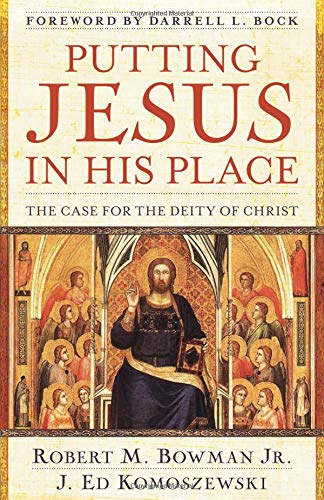Putting Jesus in His Place: The Case for the Deity of Christ
Written by Robert M. Bowman Jr. and J. Ed. Komoszewski Reviewed By David H. WenkelThe first item of note about this book is that the authors developed an extensive website and blog to promote and explain it at www.DeityofChrist.com. This website provides information about the authors’ seminar ministry that aims to provide attendees with “a thorough understanding of Christ’s deity and the ability to convey that understanding comprehensively, concisely, and clearly.” The website provides contact information for those who want the authors to provide a seminar at their venue. A free sample chapter is available for those who wish to consider purchasing the book. The target audience of this book is Christians who want to develop a strategy for engaging in apologetics- and evangelism-training that is Christ-centered and specifically able to articulate that Jesus is fully divine.
Because the authors are engaged in public ministry, their writing is academic as well as accessible. The entire content of the book is oriented around the five-point acronym HANDS. This acronym draws from the role that Jesus’ hands played in providing Thomas evidence of his resurrection in John 20:24–29. This acronym stands for Jesus having a divine identity based on the following: Honors, Attributes, Names, Deeds, and Seat. It is focused on developing the main point of this book: Jesus is God. The book builds on the presuppositions that beliefs about Jesus will come from the NT, that the NT’s statements are true as well as historically accurate, and that Jesus’ divinity is to be understood in a Trinitarian construction (p. 21).
The value of this book is that the authors intentionally move beyond a few key passages that are well known to many Christians in order to prove that a “comprehensive case” can be made from the NT for the deity of Jesus Christ (p. 21). The introduction states the author’s intention to avoid proof-texting or citing biblical passages without discussing their interpretation. Those looking for accessible clarity combined with scholarship will be pleased with this volume. The authors cite from several published dissertations and critically engage scholars such as Larry Hurtado (p. 58), James D. G. Dunn (p. 81), N. T. Wright (p. 83), Richard Bauckham (p. 269), and Geza Vermes (p. 199).
The apologetic approach underlying this book may disappoint some readers who are looking for philosophical sophistication. The method of argumentation is essentially based on an inductive study of the NT that draws from narrative and literary criticism and synthesizes data across the testaments. This approach is also its major strength as the sheer volume of texts that support the deity of Christ gives the reader a sense of how strong the case is. The major thrusts of the apologetic arguments are against Jehovah’s Witnesses and their New World Translation. There is some interaction with Islamic ideas about Jesus’ divinity as well.
The most important criticism to note is that the size, scope, and depth of the material may be intimidating to many laymen. The authors did not quite achieve their stated goal of providing a book that could serve as a Sunday school text (p. 15). This criticism must be balanced by noting that it will be an excellent resource for developing a sermon series or Bible-institute class. The style is very clear and engaging, but many parishioners have not even been exposed to textual criticism let alone the various criteria used to weigh variants (p. 51). There are helpful charts and illustrations throughout, and the use of endnotes makes the book more approachable. Other difficult issues for laymen will include advanced vocabulary and a few untranslated Greek transliterations. Those most likely to appreciate this volume are pastors and Bible college students.
David H. Wenkel
David H. Wenkel
God’s People Church
Deerfield, Illinois, USA
Other Articles in this Issue
We want to understand how the power of God comes into our preaching...
Martin Luther was a pastor-theologian. He worked out his theology in the midst of teaching, preaching, participating in public controversy, and meeting all kinds of pastoral needs...
Bearing Sword in the State, Turning Cheek in the Church: A Reformed Two-Kingdoms Interpretation of Matthew 5:38–42
by David VanDrunenAmong the many biblical passages that provoke controversial questions about Christian non-violence and cooperation with the sword-bearing state, perhaps none presses the issue as sharply as Matt 5:38–42...
Does “Christocentrism” betray an asymmetrical trinitarianism that neglects the Father and the Spirit? The spate of calls for “Christ-centeredness” in evangelicalism’s past few generations collude with the twentieth century’s revivified trinitarianism to prompt this question...
feel honored to be able to give this lecture named after John Wenham...







